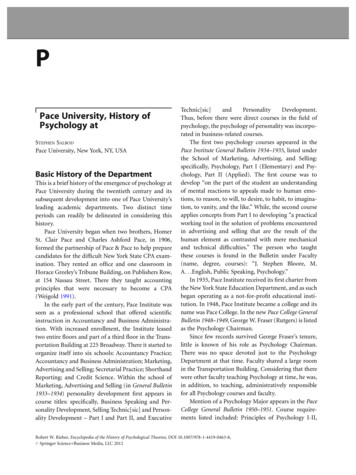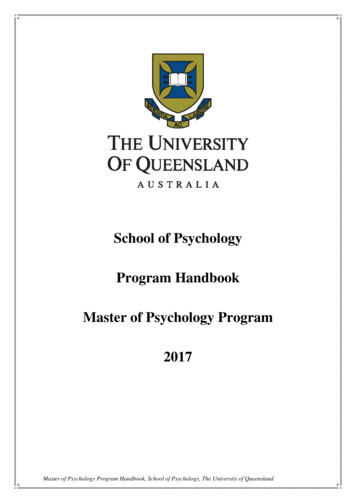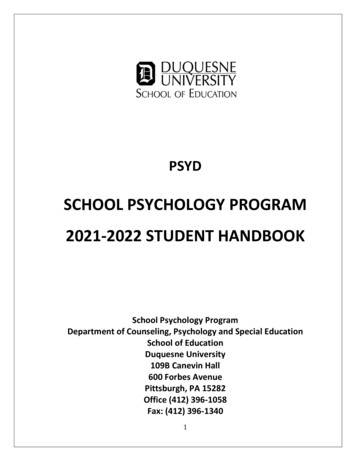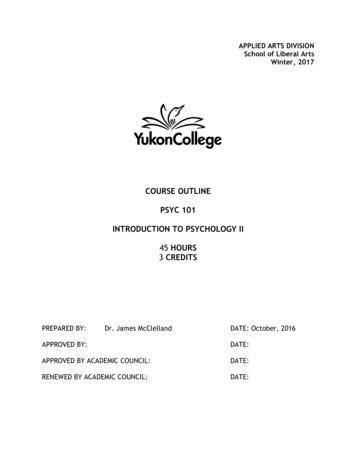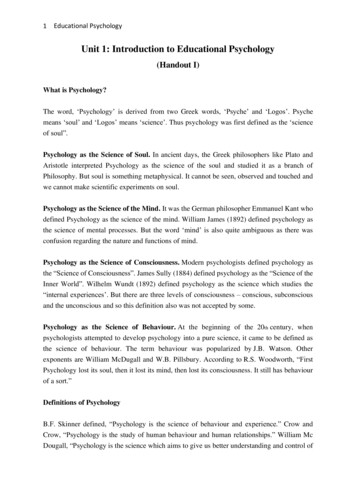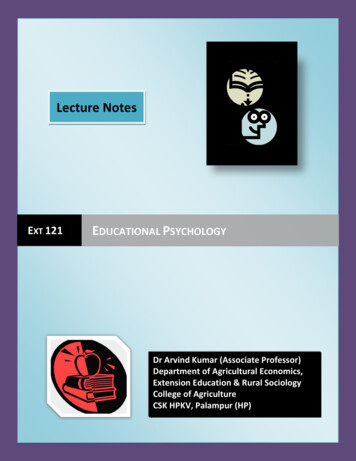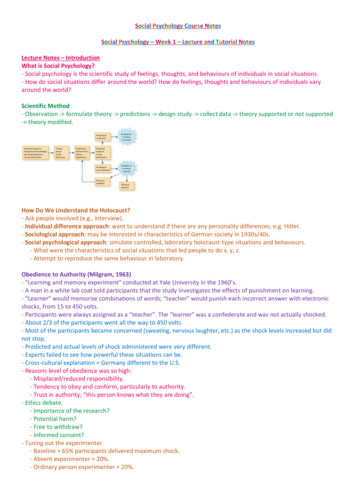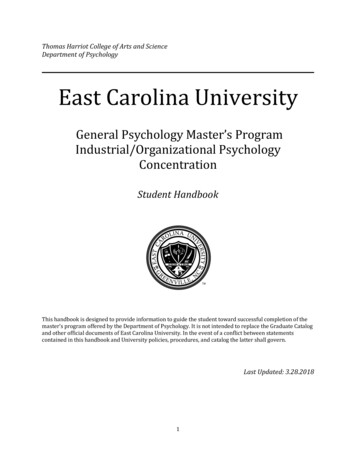
Transcription
Thomas Harriot College of Arts and ScienceDepartment of PsychologyEast Carolina UniversityGeneral Psychology Master’s ProgramIndustrial/Organizational PsychologyConcentrationStudent HandbookThis handbook is designed to provide information to guide the student toward successful completion of themaster’s program offered by the Department of Psychology. It is not intended to replace the Graduate Catalogand other official documents of East Carolina University. In the event of a conflict between statementscontained in this handbook and University policies, procedures, and catalog the latter shall govern.Last Updated: 3.28.20181
I. TABLE OF CONTENTSI.II.III.TABLE OF CONTENTSPROGRAM FACULTYINTRODUCTIONA. Industrial/Organizational PsychologyB. Industrial/Organizational Psychology ConcentrationC. Overall Program ObjectivesIV. FACILITIESA. Computer ResourcesB. Office SpaceC. Research SpaceD. Library ResourcesE. Office SuppliesF. SecurityV.PROFESSIONAL ETHICSA. Policy on DiscriminationB. Policy on Sexual HarassmentVI. PROGRAM DIRECTORA. Class SchedulesB. RegistrationVII. FINANCIAL SUPPORTA. Graduate AssistantshipsB. Unsatisfactory Performance of a Graduate AssistantC. Remission of Out-of-State TuitionD. Tuition Waivers for Persons at Least 65 Years of AgeE. Out-of-State Tuition Waivers for Military PersonnelF. Travel SupportG. Scholarships Available to StudentsH. Veterans Administration Educational PaymentsI. Financial AidVIII. COURSE OF STUDYA. Full-Time and Part-Time StatusB. Academic SequenceC. Transfer of Graduate CreditIX. THESIS PROJECTA. Committee Chair and MembersB. Proposal PreparationC. Proposal MeetingD. Completing the ThesisE. Thesis DefenseF. Depositing the ThesisG. Thesis HoursX.WRITTEN COMPREHENSIVE EXAMA. TimingB. FormatC. CoverageD. 6171819191920202020212122222323232323
XI.INTERNSHIPA. Internship CriteriaB. Internship Placement ProceduresC. Course CreditXII. FINANCIAL, HEALTH, OR EMOTIONAL DIFFICULTIESA. The Center for Counseling and Student DevelopmentB. Student Health ServiceC. Other Referrals for Personal DifficultiesD. Student Government Association Student Legal ServicesE. ECU LGBT Resource CenterF. Office of the Victim AdvocateXIII. NORTH CAROLINA RESIDENCYXIV. BEYOND REQUIREMENTSXV. GUIDELINES FOR PEER MENTORSXVI. APPENDIX3252525252626262627272728293032
II. PROGRAM FACULTYAssociate Professor,Program DirectorDr. Shahnaz Aziz252-328-1379Rawl 224azizs@ecu.eduAssociate ProfessorDr. Jennifer Bowler252-328-6474Rawl 320bowlerj@ecu.eduAssociate ProfessorDr. Mark Bowler252-328-0013Rawl 111bowlerm@ecu.eduAssistant ProfessorDr. Alexander Schoemann252-328-4955Rawl 220schoemanna@ecu.eduProfessorDr. Karl Wuensch252-328-9420Rawl 137wuenschk@ecu.eduAffiliated Faculty4
III. INTRODUCTIONThis handbook is designed to provide information to guide the student toward successful completion ofthe master’s program offered by the Department of Psychology. It is not intended to replace theGraduate Catalog (http://www.ecu.edu/registrar/catalog.cfm) and other official documents of EastCarolina University. In the event of a conflict between statements contained in this handbook andUniversity policies, procedures, and catalog the latter shall govern.Welcome to the Industrial/Organizational Psychology (I/O) concentration at East CarolinaUniversity. Our faculty looks forward to a rewarding professional collaboration with you duringthis important time in your life, as you set the final foundation of your future career.Applied psychology involves the application of psychological principles to people-related problemsin various settings. As professionals, our challenge is to enhance the understanding of psychologywhile applying it in a manner that improves the lives of individuals. You are now in the process ofjoining our community of applied psychologists who teach, consult, and work in a wide variety ofsettings such as universities, government agencies, private industries, and private practice.Towards this end, we will serve as your advisors, mentors, and colleagues.Your graduate training will serve as an apprenticeship to provide you with the knowledgeand experience that will enable you to move confidently into the world of Industrial/OrganizationalPsychology. During this apprenticeship, you will have opportunities to develop throughcoursework, as well as various research and practical experiences. You will advance through corepsychology courses, advanced quantitative courses, and specialized content courses. There areopportunities for research and practical experiences both inside and outside the university thatprovide valuable introductions to the world of applied psychology, including its challenges, andopportunities.Satisfactory progress in our graduate program is not just a matter of doing well in coursework. Thebiggest difference you will note between our master’s concentration and your previous academicwork is the breadth and depth of understanding expected regarding the material in courses. Ourprogram does not exist just to pass on existing knowledge; we are dedicated to expanding theknowledge base of our field and enthusiastically welcome you, encourage you, and expect you tomake contributions in this endeavor.Upon successfully fulfilling all of the program requirements, you will be awarded the degree ofMaster of Arts in General-Theoretic Psychology with a concentration in Industrial/OrganizationalPsychology, symbolizing the completion of a comprehensive, scientist-practitioner programdesigned to develop a fully capable and responsible applied psychologist. The journey may be longand challenging, but we hope that you will find it exciting and immensely fulfilling.Industrial/Organizational PsychologyAs noted by Division 14 of the American Psychological Association, Industrial/OrganizationalPsychology is the educational, scientific, and professional contribution of psychology to: Identify training and development needs;Design and optimize job and work and quality of work life;Formulate and implement training programs and evaluate their effectiveness;5
Coach employees;Develop criteria to evaluate performance of individuals and organizations; andAssess consumer preferences, customer satisfaction and market strategies.The specialty of I/O Psychology is characterized by the scientific study of human behavior inorganizations and the work place. The specialty focuses on deriving principles of individual, groupand organizational behavior and applying this knowledge to the solution of problems at work.Specialized knowledge and training in the science of behavior in the workplace requires in-depthknowledge of organizational development, attitudes, career development, decision theory, humanperformance and human factors, consumer behavior, small group theory and process, criteriontheory and development, job and task analysis and individual assessment. In addition, the specialtyof industrial-organizational psychology requires knowledge of ethical considerations as well asstatutory, administrative, and case law and executive orders as related to activities in theworkplace.The specialty of I/O Psychology addresses issues of recruitment, selection and placement, trainingand development, performance measurement, workplace motivation and reward systems, qualityof work life, structure of work and human factors, organizational development and consumerbehavior.Industrial and Organizational (I/O) psychologists contribute to an organization's success byimproving the performance and well-being of its people. Some of the business strategies that I/Opsychologists assist with include: (1) Recruiting, hiring, and retaining the most qualified employees,(2) developing fair, legal, and efficient hiring practices, (3) designing and implementing newtraining programs, (4) increasing diversity in the workforce, (5) developing performancemanagement systems, (6) minimizing absenteeism, (7) eliminating harassment and discrimination,and (8) increasing motivation and enhancing work-life balance.Industrial/Organizational Psychology is closely linked to the professional organization, Society forIndustrial and Organizational Psychology (SIOP).Industrial/Organizational Psychology ConcentrationThe I/O concentration is a two-year, full-time, post-baccalaureate program with admission in thefall semester. The curriculum includes the following components: Research methods courses that address statistical analysis and experimental design;Industrial/Organizational concentration courses that address the interface betweenindividuals and organizations.Additionally, students are expected to complete a written comprehensive exam, as well as aninternship or a thesis.6
Overall Program ObjectivesBy the time you complete the Industrial/Organizational Psychology concentration, you will be ableto:1. Demonstrate understanding and use of psychological principles and techniques at anadvanced level. Such use will be based upon a comprehensive knowledge of I/O psychologyfrom a core set of courses;2. Read, review, and critique psychological literature and write research reports at a level ofexpertise commensurate with that represented in current research journals;3. Demonstrate an ability to explain, use, and apply statistical principles and techniques at alevel allowing you to assist others in designing psychological experiments;4. Prepare and use a comprehensive, critical review of the literature on a psychologicalproblem;5. Present psychological material verbally to professional audiences6. Display a high degree of competence in an area of specialization as demonstrated byperformance on a written comprehensive exam; and7. Demonstrate awareness of current professional problems in psychology (e.g., ethicalproblems).7
IV. FACILITIESThe Department of Psychology is housed in the Rawl Building. The department has laboratoryfacilities and equipment used for the study of human behavior throughout the building.Computer ResourcesThe Department of Psychology has several labs in the Rawl building that are available for graduatestudent use. As some of these labs are used for class instruction, there may be times when access isrestricted. For undergraduates not directly assisting faculty members with research, access isrestricted to their specific class times. Additionally, the university has numerous computer labs oncampus that are available to students. You may contact ECU Information Technology andComputing Services (http://www.ecu.edu/cs-itcs/) for more information.Office SpaceSpace limitations restrict the available space for graduate student offices. Students should consultwith their advisor regarding workspace.Research SpaceResearch space in the Department is allotted to specific faculty members. When you havedetermined your research space needs, contact your advisor and he or she will assist you withlocating the appropriate venues(s) for your research. Research space at the university is at apremium, and early requests will help to ensure that your needs are met.Use of research space is limited to psychology students and their experimental participants forrequired coursework and approved research. No visitors (except participants) are permitted in thelaboratory areas without the permission of a faculty member. All keys and research space will beissued by the Department based on approval by a faculty member.Students should understand that the Department currently has a severe shortage of assignablespace, meaning that efficiency in the shared use of space is a necessary. Students are responsible forkeeping their research areas clean, secure, and neat at all times.Library ResourcesEast Carolina University has two primary library facilities. The Joyner Library(http://www.ecu.edu/cs-lib/) is located on main campus and provides the main portal for alldigital records (e.g., PsycInfo), and the Laupus Library (http://www.ecu.edu/csdhs/laupuslibrary/) is located in the medical school.Special cooperative arrangements with libraries at other local university campuses supplement theresources available on campus. Students at ECU may borrow books from other schools in the UNCsystem via interlibrary loan. The Interlibrary Loan office can provide photocopies of journal articlesand loan books, theses, and other materials.8
Office SuppliesCommon office supplies are available for use by teaching assistants and research assistants. Theyare located in the main office of the Department and are to be utilized for official Departmentbusiness (i.e., research or teaching) only. Similarly, the two copying machines in the main office areto be used strictly for official business. Please note that the use of these machines is permitted onlyafter a student has received instruction on operation of the equipment by a member of the officestaff or a supervising faculty member. Furthermore, each machine requires a specific code that isassigned to faculty members.Equipment such as digital projectors may be checked out through the main office of theDepartment. All damaged and broken equipment must be reported to the relevant staff member assoon as possible so that it may be repaired and returned to service. No equipment is to be removedfrom the Rawl Building without prior permission from the relevant staff or faculty member. Allequipment and keys must be returned immediately following the completion of the activity forwhich they are used. No equipment is to be modified in any way.SecurityAll graduate students should make every effort to ensure that the laboratory and office facilities ofthe Department are secure at all times. Doors should be locked when leaving any room. Policeshould be called (252-328-6787) if anyone suspicious is seen in any of the facilities.9
V. PROFESSIONAL ETHICSBoth faculty and students are expected to abide by the ethical code of conduct set forth by theAmerican Psychological Association (see http://www.apa.org/ethics/). However, past literature onethical problems has typically focused on issues relating to clinical psychology. Subsequently,Division 14 of the American Psychological Association has published a casebook particularlyappropriate to other areas of psychology such as I/O.Lowman, R. L. (2006). The ethical practice of psychology in organizations. AmericanPsychological Association: Washington, DC.This book is available from the American Psychological Association.Professional and ethical issues are addressed formally in both the Ethics and Professional Practice(PSYC 6454) and Issues is Personnel Selection (PSYC 6420). However, in order to minimize thepossibility of ethical conflicts, students and faculty should familiarize themselves with thepreviously mentioned documents and not depend solely on classroom discussion of such issues. Ifyou believe an ethical violation may have occurred, discuss this with either the Program Director,the Department Chair, or write or call the American Psychological Association Ethics Office inWashington, D.C.Policy on DiscriminationThe university does not tolerate discrimination on the basis of age, race, sex, national origin, sexualorientation, and/or religious beliefs. If you believe you have been subject to such discrimination,you should contact the Program Director, the Department Chair, or the university's affirmativeaction/equal employment officer as soon as possible.Policy on Sexual HarassmentSexual harassment by either faculty or students will not be tolerated by the department or theuniversity. If you believe you have been subject to sexual harassment, you should contact theProgram Director, the Department Chair, or the university's affirmative action/equal employmentofficer as soon as possible.10
VI. PROGRAM DIRECTORA program director serves a number of functions for students. In conjunction with the student, heor she can help the student determine the schedule of classes for each semester, answer generalquestions about the program, and assist the student in terms of his or her career planning andresearch interests.The program director is the first point of contact for any problems that may arise and should beconsulted before any program changes are made. His or her function is to determine how to meetthe goals and needs of the individual student most effectively and to provide guidance on graduatestudy, including areas such as: (1) coursework, (2) internships and other professional activities,and (3) resolution of problems as the student progresses through the program. In short, theprogram director is the student’s advocate and the student should develop a close professionalrelationship with him/her.Class SchedulesBefore enrolling each semester, a student should plan a schedule of classes for that semester.Because of developmental concerns and scheduling constraints, students are expected to takecertain classes during particular semesters in the program.RegistrationAll students are advised to register as early as possible for each semester’s classes. Long beforeclasses begin, the administration at ECU reviews the enrollment in each class. If a class does nothave sufficient enrollment, it can be canceled. This can be very disruptive for a student’s progressas some classes are offered only once in a three year period. Therefore, the faculty request that youregister as soon as possible.11
VII. FINANCIAL SUPPORTGraduate AssistantshipsStudents are offered funding in the form of graduate assistantships on a competitive basis. Thestudent’s responsibility is in the provision of teaching and/or research support whereby thestudent is paid for his/her time. These activities are completed based on pre-specified contractedservices for time via East Carolina University policy. A part-time graduate assistantship (10 hoursper week - fall and spring semesters) will be worth a minimum of 4,500. Departments may opt topay their assistants at a higher rate if they deem it appropriate by using one source or multiplesources of funds. More specific information is not available until offers of admission are made eachspring because new grants might be received and financial conditions may change.The following list is assistantship definitions prepared by the Graduate School: Assistantship. An arrangement in which financial support is given to a graduate studentwho performs specific services (see definitions of assistantship types below) in furtheranceof his/her graduate education.Graduate Assistant (GA). An arrangement in which financial support is given to a graduatestudent who may provide a wide variety of services related to academic and programmaticsupport. GA responsibilities may be administrative in nature such as academic advising,program planning, advising student groups, and assisting with the administration of studentservices offices. GA responsibilities may also be academic in nature such as: (i) gradingexaminations, problem sets, and/or laboratory assignments, (iii) setting up displays forlectures or laboratory sections, and (iii) preparing or maintaining equipment used inlaboratory instruction.Graduate Research Assistant (GRA). An arrangement in which financial support is given to agraduate student who performs thesis/dissertation research of a type that is required fromall candidates for the degree. The student is expected to devote considerable time onresearch that is academically significant and directed by a faculty advisor. Often the facultyadvisor is a principal investigator working on an externally-funded grant/contract.Graduate Teaching Assistant (GTA). An arrangement in which financial support is given to agraduate student who provides academic program support under the supervision of afaculty member. GTAs may assist faculty in teaching undergraduate courses, includinglaboratory teaching assignments, or in providing other appropriate academic assistancesuch as: (i) grading examinations, problem sets, and/or lab assignments, (ii) setting updisplays for lectures and laboratory sections, and (iii) preparing or maintaining equipmentused in instructional laboratories. Please note that to be eligible for a graduate teachingassistantship, the student must have satisfactorily completed a minimum of 18 semesterhours of graduate course work in the field in which instruction is given, receive in-servicetraining, be under the direct supervision of an experienced faculty member in the field, andbe evaluated each semester.Partial Assistantship. An arrangement in which financial support is given to a graduatestudent appointed as a part-time GA, GRA, or GTA. For example, in return for half the serviceexpected of a regular assistant, the student receives half the regular stipend.12
In order to be eligible for an assistantship, students must be accepted into the master’s program inPsychology, be currently enrolled for at least one graduate psychology class, and maintain a 3.0 GPAor higher. No three-quarter or higher FTE state employee may hold a graduate assistantship.Students are ineligible for assistantships if they are not registered by census day. Census day isdefined as the day that enrollment is captured and, concurrently, how ECU’s funding is awarded. Agood rule of thumb to follow is to make sure that anyone on an assistantship is registered on orbefore the last day to add classes each semester.The Department of Psychology policy and recommendation is that Graduate Assistants should notwork more than 20 hours per week during the academic year. (The Graduate School policy limitsGraduate Assistants to 25 hours per week in the fall and spring semesters in any combination ofappointments – GA/RA/TA, self-help, College Work Study, EPA/SPA. However, we feel that 25hours per week is too difficult to juggle with a full course load.) Foreign students are limited to 20hours per week, no exceptions (this is a federal requirement). During first and second summersessions, all graduate students are limited to 30 hours per week. Requests for exceptions to the 30hour rule must be made via petition to the Director of Graduate Studies and the Graduate School.The assistantship always spans the entire semester from registration to the last day of final exams,inclusive. Students should therefore plan on being present on campus and fulfill their assistantshiprequirements during this entire period. All assistantships require a signed contractual agreementbetween the graduate student and the Psychology Department. Any revocation of the contract bythe graduate student without expressed agreement of the student’s Program Director, Director ofGraduate Assistants and consent by the Department Chair will result in forfeiture of assistantshipeligibility. Additionally, students must inform the Director of Graduate Assistants if they areengaged in part-time or full-time employment within or outside of the university setting.Assistantships may be available in departments outside of Psychology for students who are unableto obtain an assistantship within the department. No full-time state employee may hold a graduateassistantship.Once graduate assistantship assignments are determined, the graduate student is responsible forcontacting the assigned faculty member(s). A work schedule, specifically detailing each week’sactivities and work hours, is completed, signed by the faculty member and returned to the Directorof Graduate Assistants during the first week of the semester. Certain assignments, researchendeavors, or laboratory work may require the student to work unequal weekly hours during thesemester. When this is the case, the hours are to be mutually agreed upon and scheduled betweenthe graduate assistant and the faculty member beforehand. If the assigned faculty member does nothave specific work assignments or cannot utilize the student for the assigned hours, then thestudent will be re-assigned. For the fall semester only (or first time graduate assistants), studentsshould see the department administrative staff to complete appropriate application, payrolldeduction, and tax forms.Psychology faculty may request specific assignments and/or graduate assistants with deferencebeing given to faculty members with external funding. Psychology graduate students may requestspecific assignments and/or graduate assistantships. Student requests of this nature should bedirected to the Program Director and these requests will be used in making assignments along withschedule and budgetary limitations.If a student is experiencing problems working with the faculty member responsible for oversight,the student must meet directly with the faculty member to attempt to resolve the problem. If thestudent feels that discussing the problem directly with the faculty member may jeopardize his/her13
program of study, then the student should meet with the Director of Graduate Assistants. If theproblem is not resolved at that level, the student then meets with the Director of GraduateAssistants and his/her Program Director to devise a viable solution to the problem. No facultymember or graduate assistant may terminate the graduate assistantship contract during thesemester; this can only be done by the Director of Graduate Assistants. Faculty members andstudents may contact the Director of Graduate Assistants directly.Graduate students are evaluated at the end of each semester. Attaining unsatisfactory evaluationsfrom two faculty members simultaneously during one semester or two consecutive unsatisfactoryevaluations will result in discontinuation of assistantship assignment for future semesters. Astudent acting in an unreliable manner results in discontinuation of assistantships.Unsatisfactory Performance of a Graduate AssistantWhen a faculty member responsible for oversight is dissatisfied with a student’s performance, thefollowing steps should be taken:1. The faculty member responsible for oversight should, in the course of routine mentoring,discuss the shortcomings of the student’s performance, making specific recommendationsfor changes.2. If improvement is not made, the faculty member responsible for oversight must advise thestudent in writing of his/her concerns and allow sufficient time for the student to addressthe performance issues raised by the faculty member responsible for oversight. This writtenstatement must, once again, contain specific recommendations for changes in performanceand a time line for such change to occur. A copy of this letter must be sent to the Dean ofGraduate Studies in the student's field.3. Recognizing that financial assistance is contingent upon good academic standing as well assatisfactory assistantship performance, the assistantship contract may be terminated ifsufficient improvement is not made in a timely manner. The faculty member responsible foroversight must provide notification of such a termination in writing. This notification muststate that the student has the right to file a grievance with the Graduate School.4. The Graduate School grievance policy provides a mechanism for further review if thegraduate student believes the action to be unfair and he or she is unable to resolve thematter at the field level.A graduate assistant who receives feedback indicating unsatisfactory performance is encouraged, atany time during this process, to confer with the faculty member responsible for oversight and theDean of Graduate Studies.Remission of Out-of-State TuitionOut-of-state students may qualify for an out-of-state tuition remission that is worth the differencebetween out-of-state tuition and in-state tuition rates. These remissions are awarded on acompetitive basis and are limited. Generally, out-of-state remissions are for one academic year only(fall and spring semesters) and are not renewable. On occasion, there is additional money availablethrough the Graduate School to provide for tuition remission for summer school, and informationon the availability of summer tuition remissions is usually available late in the spring semester. A14
student awarded an out-of-state tuition remission is responsible for paying in-state tuition and alluniversity fees.Students are encouraged upon arrival to review information on establishing legal residency inNorth Carolina at: m, if their intent is tobecome permanent legal residents of North Carolina. By North Carolina law, students whoseprimary intent for moving to the state is to attend school are not eligible for classification as instate for tuition purposes; however, those that demonstrate a clear intent to become permanentNorth Carolina residents may qualify for the in-state classification after at least one year of legalresidency in the state.Students should keep in mind that resigning from an assistantship, dropping a course, orwithdrawing from the university can all result in having their tuition remission rescinded andbecoming personally responsible for payment of their tuition cost. Likewise, adding a course mayincur additional cost to the student, so students should investigate the financial impact of suchchanges prior to making them.Tuition Waivers for Persons at Least 65 Years of AgePersons 65 years of age and older who meet the requirements for the in-state rate of tuition and theuniversity requirements for admission may have their tuition and fees waived, provided space isavailable in the course being sought.Out-of-State Tuition Waivers for Military Personnel and Their DependentsAccording to N.C. General Statute 116-143.3 certain members of the armed services and theirdependent relatives may be eligible to be charged a tuition rate less than the out-of-state ratewhether or not they qualify as residents for tuition purposes. It is required that the member of thearmed services and any dependent relative claiming the tuition waiver be living together in NorthCarolina, and that the member of the armed services have an assigned duty station in NorthCarolina.Travel SupportTypically, s
Industrial/Organizational Psychology is closely linked to the professional organization, Society for Industrial and Organizational Psychology (SIOP). Industrial/Organizational Psychology Concentration The I/O concentration is a two-year, full-time, post-b
